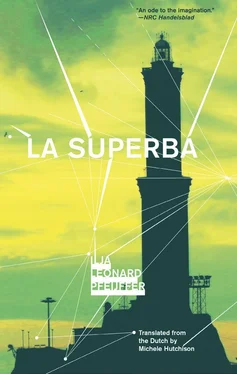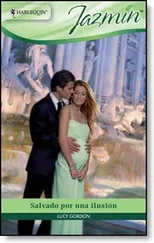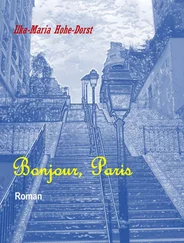Street names and pavement. That’s the way I formulated it. In the first instance as a stylistic device, of course, sketched with the rough sprezzatura that characterizes my writing. But in the second instance, it’s true, too. I’ll give you an example: Vico Amandorla can make me so happy. It’s an insignificant alleyway that runs from Vico Vegetti to Stradone Sant’Agostino. It’s a short stretch, and you don’t encounter anything of any importance along the way. The alleyway isn’t even pretty, at least not in the conventional manner. Normal, ugly old houses and normal, smelly old trash. But the alley curves up the hill like a snake. A little old lady struggles uphill in the opposite direction. The alley is actually too steep, built wrongly centuries and centuries ago or just sprung into existence in a very awkward manner. The alley is pointless, too. You come out too far down, below the Piazza Negri. If you want to be there, at San Donato, it’s much better to just take Vico Vegetti downhill and then turn right along Via San Bernardo. That’s faster and more convenient. And if you want to be in the higher part of the Stradone Sant’Agostino, at Piazza Sarzano, it’s much quicker and more convenient to follow the same Vico Vegetti in the other direction, past the Facoltà di Architettura straight to Piazza Negri. All of this makes me very happy. And then the pavement. This alley isn’t paved with the large blocks of gray granite you get everywhere in Genoa, but with cobblestones as big as a fist. You can’t walk on them. There’s a strip of navigable road laid with narrow bricks on their sides. Half of them have sunk or come loose. There hasn’t been any maintenance here since the early Middle Ages. And then that name. Who in the world wouldn’t want to stroll along Vico Amandorla? It’s a name that smells like a promise, as soft as marzipan, as mature as liquor in forgotten casks, in the cellar of a faraway monastery where the last monk died twenty years ago one afternoon with an innocent child’s prayer on his lips in the cloister gardens, in the shadow of an almond tree, as happy as a man after a rich dinner with dear friends. Say the name quietly if you are afraid and you won’t be afraid anymore: Vico Amandorla.
From Piazza Negri you can walk, during museum opening hours, through the cloister gardens of Sant’Agostino to Piazza Sarzano and the city walls. The passage through the cloister is triangular, undoubtedly as an architectonic compromise with exceptional topographical circumstances. The tip points toward the tower, which is sprinkled with colorful mosaics that clash with the strict and sober gray of the cloister. What’s the statement? What must the monks who wore away the pavement of the cloister passage with their footsteps have thought at the sight of their own festive tower? That it was Mardi Gras outside? That the gray life in the cloister clashed with that path upwards to heaven, a path as garish and variegated as a rocket, ready to be fired so that it can burst out into a cascade of colors?
Piazza Sarzano is a square that I still don’t really get, a square like a formless mollusk with a Metro station I never see anyone going into or coming out of. But just to the right of it, left of the church, is a secret passageway to another city — a medieval wormhole. With its profound and contented pavement, the street swings steeply up the hill to a forgotten and abandoned mountain village straight out of Umbria or Abruzzo. A handful of narrow, abandoned little streets that rise and fall around a shell-shaped village square that slumbers in the sunshine. But in the distance you don’t see any mountaintops, no hills crosshatched with vines, no goatherds, but the docks of Genoa. This is a magical place you cannot be in without realizing that you actually can’t be there because the place cannot exist. This is Campo Pisano, a perfect name euphonically, an ideal marriage between sound and rhythm. Its meter is the triumphant final chord of a heroic verse. The name fits perfectly after the bucolic diaeresis of the dactylic hexameter. The succession of a bi-syllabic and tri-syllabic obeys the Gesetz der wachsenden Glieder and creates a charming auslaut after the first unmarked element of the dactyl, by which an ideal alternation between a falling and a rising rhythm arises. The sound is carried by the open vowels that shine like the three primary colors on an abstract painting by Mondrian. The falling movement from the a to the o finds a playful counterpoint in the high i before it is repeated.
The cool hard consonants articulate the composition like the black lines on the same painting, with the racy repetition of the p right in the middle. It is a name like an incantation to evoke a magical abode. A spell of otherworldly sophistication is needed to bring to life an impossible place. If someone were to unscrew the street’s nameplate from the wall, Campo Pisano would vanish into the mists of the docks, only to reappear when an ancient high priest remembered the name and it passed through his wrinkly lips between the Barbarossa walls and the sea. Campo Pisano. It’s a happy place with a tragic past, in the same way that only people who have known pain can be happy because people who are painlessly happy like that blow away like a Sunday paper in the wind of an early day in spring. This place was once a kind of Abu Ghraib. Prisoners of war were locked up here after La Superba’s army and navy had finally put down their archenemy Pisa for good. The curses of the defeated and humiliated Pisani still ring out to this day. Symbols of Genoa’s power are worked into the pavement in mosaics made of uneven pebbles. I’m the only person about at this time of day. The green shutters on the houses are closed. The wine bar won’t open until the evening. In the distance I can hear a goat bleating, or a ferry honking.
Vico Superiore del Campo Pisano is a dead end, but Vico Inferiore del Campo Pisano isn’t. Or the other way round. It depends which day it is. One of the two of them is a new wormhole, not back to Genoa and the present, but to America and yesterday’s future. The road curves gently downhill to the left and leads to a grotto. Dampness and vegetation seep from moldy walls. These are the vaults of the bridge that links Piazza Sarzano with the Carignano quarter. The high priest lives under the last arch. His skull is older than the city. High above him, the people of Genoa go in search of parking spots and bargains. Closer to the sea the fast traffic races along the Sopraelevata, the raised motorway along the coast.
The grotto opens out into a post-apocalyptic landscape, or to be more precise: this is the perfect location to film an old-fashioned science fiction film, preferably in black and white. Its official name is Giardini di Baltimora, but people know it as Giardini di Plastica, the plastic garden. It’s a gigantic dog-walking spot that also serves as a shooting-up area for heroin addicts and a kissing zone for young couples without places of their own. It looks like a 1960s or ’70s version of the twenty-first century. Desolate green with charmingly gray mega-office-blocks. Above-ground nuclear bunkers in a field of stinging nettles. Pre-war spaceships that have crashed in a forgotten hole in the city and gradually been reclaimed by nature.
All kinds of pathways go back up to the Middle Ages from here, or to Piazza Sarzano or Via Ravecca. But you can also walk under the supports of the rusty behemoths, across the underground car park beneath which the motorway runs to the sea, past peeling bars and clubs with unimaginative names, under the skyscraper, to Piazza Dante. The city will reveal itself to you there once again, with an ironic smile. Yes. After your epic journey, you’re simply back on Piazza Dante. Thousands of Vespas, Porta Soprana, Columbus’s house, the cloisters of Sant’Andrea, in the distance the fountain on Piazza de Ferrari and, on the other side, Via XX Settembre. You know every street here. It’s just a three-minute walk to your favorite bars. You burst out laughing in surprise. But how am I ever going to write about this, my friend? How can I ever make people believe that a city makes me happy?
Читать дальше












